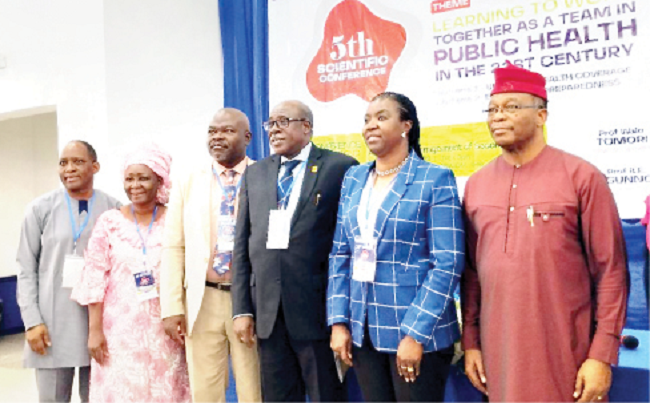How preventing unwanted pregnancies can reduce abortions and deaths — Experts
Induced abortion is illegal in Nigeria except when performed to save a woman's life. Both the penal code, generally applied in the northern states of the country, and the penal code, generally applied in the southern states, allow this exception and the regions provide similar criminal penalties for non-compliance.
However, terminations of pregnancy are quite common and, since they are often carried out clandestinely or by unqualified providers, they are sometimes dangerous. A recent survey indicated that unwanted pregnancies and abortions are common among women around the world.
Dr. Jonathan Bearak, Senior Research Scientist at the Guttmacher Institute, in A Global Overview of Unintended Pregnancy and Abortion, said that most abortions happen because the pregnancies are unwanted at the time of pregnancy. conception, or whether they occurred earlier than desired, or what in public health is called unintentional.
Similar Items
He spoke at a special session on: "Public Health Challenges of Unintended Pregnancy and Abortion: Global and National Dimension", organized by a non-governmental organization, the Academy for Health Development (AHEAD), Ile-Ife, Osun State. , in collaboration with the Guttmacher Institute, New York, USA.
The session was part of the activities of the fifth Scientific Conference of the Society of Public Health Professionals of Nigeria (SPHPN), held at the Lagos State Teaching Hospital (LASUTH), Ikeja.
Bearak said that between 2015 and 2019, an average of 250 million pregnancies occurred each year, adding that 121 million of those pregnancies were unintended (wanted later or not at all) and 73 million resulted in one abortion each year.
New global estimates from the Guttmacher Institute indicate that the incidence of unintended pregnancies among women aged 15 to 49 is lowest in high-income countries and highest in low- or low-income countries. intermediate. It was 34 per 1,000 among women aged 15-49 in high-income countries and 93 per 1,000 among women aged 15-49 in low-income countries.
“Abortion rates are similar in countries where it is legal and prohibited. While the rate of unintended pregnancy and the rate of abortion have declined globally, both unintended pregnancies ending in abortion and pregnancies ending in abortion have increased.
"In high-income countries where abortion is widely legal, unwanted pregnancies ending in abortion and pregnancies ending in abortion have decreased, but instead have increased more significantly in counties that prohibited abortion, with wide variations in rates, including between countries. in a region,” the report noted.
Professor of Community Medicine and Public Health, Adesegun Fatusi, who gave Nigeria's specific estimates of unwanted pregnancies and abortion, said unsafe abortion leads to a high level of maternal mortality and is the fourth leading cause of maternal death in the world.
According to him, as many as 67,000 women die each year in Nigeria from pregnancy-related causes, with a record of at least 20 deaths per day across the country, adding that about 11 percent of deaths in mothers are due to abortion.
/p>
"It's worrying. However, we know from global data that abortion deaths are due to unsafe abortion, as statistics show globally that safe abortion does not necessarily lead to increased mortality maternal. The risk is not as great. So whenever we talk about abortion and death, we are practically talking about unsafe abortion.
“The proportion of deaths due to abortion could be higher than what we say, because some figures concerning women who bleed during pregnancy may be due to abortion, but women will not talk about it ", did he declare.
Prof Fatusi said global law had failed to deter women from wanting abortions or stem abortion, making it imperative to fully understand why abortion happens while pregnancy unwanted is established as the root cause.
“By ensuring that every woman in need of contraceptives can access information, education, services and obtain the contraceptive, we can significantly reduce the risk of abortion. This is the starting point.
“A higher proportion of those affected by unsafe abortion in Nigeria are young women between the ages of 15 and 19 who do not have access to comprehensive sex education and lack the money to get a safe abortion,” he added. .
Fatusi said abortion has a huge cost to the health system and as such the need to examine women's sexual and reproductive health laws and social norms and practices that discourage or deny people the ability to access contraceptives.
/p>
He said, "If everyone needs a...

Induced abortion is illegal in Nigeria except when performed to save a woman's life. Both the penal code, generally applied in the northern states of the country, and the penal code, generally applied in the southern states, allow this exception and the regions provide similar criminal penalties for non-compliance.
However, terminations of pregnancy are quite common and, since they are often carried out clandestinely or by unqualified providers, they are sometimes dangerous. A recent survey indicated that unwanted pregnancies and abortions are common among women around the world.
Dr. Jonathan Bearak, Senior Research Scientist at the Guttmacher Institute, in A Global Overview of Unintended Pregnancy and Abortion, said that most abortions happen because the pregnancies are unwanted at the time of pregnancy. conception, or whether they occurred earlier than desired, or what in public health is called unintentional.
Similar Items
He spoke at a special session on: "Public Health Challenges of Unintended Pregnancy and Abortion: Global and National Dimension", organized by a non-governmental organization, the Academy for Health Development (AHEAD), Ile-Ife, Osun State. , in collaboration with the Guttmacher Institute, New York, USA.
The session was part of the activities of the fifth Scientific Conference of the Society of Public Health Professionals of Nigeria (SPHPN), held at the Lagos State Teaching Hospital (LASUTH), Ikeja.
Bearak said that between 2015 and 2019, an average of 250 million pregnancies occurred each year, adding that 121 million of those pregnancies were unintended (wanted later or not at all) and 73 million resulted in one abortion each year.
New global estimates from the Guttmacher Institute indicate that the incidence of unintended pregnancies among women aged 15 to 49 is lowest in high-income countries and highest in low- or low-income countries. intermediate. It was 34 per 1,000 among women aged 15-49 in high-income countries and 93 per 1,000 among women aged 15-49 in low-income countries.
“Abortion rates are similar in countries where it is legal and prohibited. While the rate of unintended pregnancy and the rate of abortion have declined globally, both unintended pregnancies ending in abortion and pregnancies ending in abortion have increased.
"In high-income countries where abortion is widely legal, unwanted pregnancies ending in abortion and pregnancies ending in abortion have decreased, but instead have increased more significantly in counties that prohibited abortion, with wide variations in rates, including between countries. in a region,” the report noted.
Professor of Community Medicine and Public Health, Adesegun Fatusi, who gave Nigeria's specific estimates of unwanted pregnancies and abortion, said unsafe abortion leads to a high level of maternal mortality and is the fourth leading cause of maternal death in the world.
According to him, as many as 67,000 women die each year in Nigeria from pregnancy-related causes, with a record of at least 20 deaths per day across the country, adding that about 11 percent of deaths in mothers are due to abortion.
/p>
"It's worrying. However, we know from global data that abortion deaths are due to unsafe abortion, as statistics show globally that safe abortion does not necessarily lead to increased mortality maternal. The risk is not as great. So whenever we talk about abortion and death, we are practically talking about unsafe abortion.
“The proportion of deaths due to abortion could be higher than what we say, because some figures concerning women who bleed during pregnancy may be due to abortion, but women will not talk about it ", did he declare.
Prof Fatusi said global law had failed to deter women from wanting abortions or stem abortion, making it imperative to fully understand why abortion happens while pregnancy unwanted is established as the root cause.
“By ensuring that every woman in need of contraceptives can access information, education, services and obtain the contraceptive, we can significantly reduce the risk of abortion. This is the starting point.
“A higher proportion of those affected by unsafe abortion in Nigeria are young women between the ages of 15 and 19 who do not have access to comprehensive sex education and lack the money to get a safe abortion,” he added. .
Fatusi said abortion has a huge cost to the health system and as such the need to examine women's sexual and reproductive health laws and social norms and practices that discourage or deny people the ability to access contraceptives.
/p>
He said, "If everyone needs a...
What's Your Reaction?






















